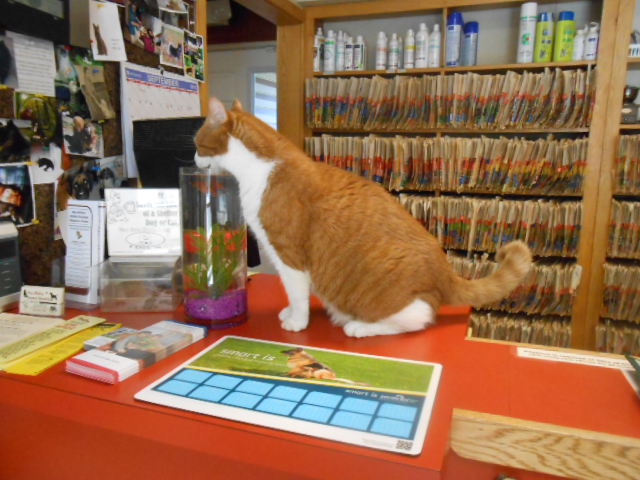Zoonosis

What is Zoonotic Disease?
There are two forms of zoonotic disease. The first form is an illness that is transmitted directly from pets to people, such as rabies, intestinal parasites, toxoplasmosis, and leptospirosis. The second form are diseases that both pets and people can share, but people cannot get directly from an animal, such as lyme disease, rocky mountain spotted fever, and diseases carried by vector species such as mosquitos, ticks, biting flies, etc.
A Few Types of Zoonotic Diseases that people can get from their pets:
- Rabies: Rabies is a deadly viral disease that affects all warm blooded animals and is found in the saliva. It is most commonly contracted though a bite wound. The disease is almost always fatal, there are only very few reports of anyone surviving after developing the rabies virus. It is EXTREMELY important for you as a pet owner to know, that both dogs AND cats legally have to be vaccinated for Rabies in New York State. Even if you have an animal that never goes outdoors- they are still at risk if an animal were to ever enter your home such as a bat. All cats and dogs should be vaccinated for Rabies at 12 weeks of age and then come in for annual or tri-annual vaccinations. It is very important to keep your pet up to date on the rabies vaccine. If your pet ever comes in contact with wildlife, a stray animal or a rabies suspect – you must have your pet’s rabies vaccination boostered within five days of exposure. If your pet is not up to date on a Rabies vaccine and is exposed- the health department will decide the fate of your pet. For more information please visit www.cdc.gov/rabies/
- Intestinal Parasites: According to the CAPC website, it is recommended that you have your pet’s stool tested for intestinal parasites two to four times a year. Intestinal parasites are not always found in the stool, often times the only way of knowing whether or not an animal has intestinal parasites is by checking under a microscope for eggs. Here at Day Hollow Animal Hospital, we know the importance of not only keeping your pets healthy, but you as a pet owner and your family as well. Many intestinal parasites such as roundworms and hookworms can be passed to people, so we strongly advise all pet owners to put their animals on a routine monthly dewormer, once a month all year round. For more information please visit www.petsandparasites.org
- Toxoplasmosis: Toxoplasma can be passed in cat feces. A healthy person may have Toxoplasma and never show signs or symptoms. However it is important to know that if you are pregnant, you should speak to your physician regarding ways to protect yourself if you have a cat in your household. If you become exposed to Toxoplasmosis while pregnant, it can be detrimental to your unborn baby’s health. Cats often times pick up this disease by eating infected rodents. It is important to always practice good hygiene when cleaning a litter box (when pregnant – avoiding cleaning the litter box), thoroughly washing fruits and vegetables, washing your hands after handling fruits and vegetables and making sure your meats are thoroughly cooked as these are also ways you can be exposed to Toxoplasma. For more information please visit www.petsandparasites.org
- Leptospirosis: Leptospirosis is a deadly bacterial disease that is commonly spread by wildlife. Common carriers of this disease include but are not limited to: raccoons, opossums, skunks, squirrels, other rodents, deet, cattle, pigs and other livestock. These carriers can pass the disease through urinating, making both you and your dog susceptible to picking up infection by swimming in or drinking infected water, or even spending time in wet areas where wildlife inhabits. If your dog becomes infected, they too can pass the disease on to you. The bacteria can enter through any mucous membrane or even a cut in the skin. We highly recommend vaccinating your dog against Leptospirosis. For more information please visit www.Leptoinfo.com
A few types of Zoonotic Diseases that people can share with their pets, but not through direct contact
- Lyme Disease: Lyme disease is transmitted to both humans and dogs through the bite of an infected deer tick. It is currently a large problem in our area. One in fifteen dogs tests positive for lyme at our clinic alone. It is very important to keep your dog on a monthly topical flea and tick preventative all year round and have yearly testing for tick borne diseases. Dogs may never show symptoms of lyme disease, however common symptoms would include but are not limited to: swollen joints, lameness, fever and decreased appetite. If left untreated it could caused damaged joints and rarely fatal kidney disease. For more information please visit: www.petsandparasites.org/expert-insights/lyme-disease-is-expanding-its-range-westward-in-2014/
- Rocky Mountain Spotted Fever: Rocky Mountain Spotted Fever is a very serious disease if left untreated. Ticks pass the disease through a single bite and can cause fever, painful joints and muscles, depression and decreased appetite in dogs.
- Anaplasma: Anaplasma is passed to a dog by the deer tick and can cause similar symptoms to Lyme disease and Ehrlichiosis. It can make a dog have a high fever, swollen and painful joints, depression, anorexia and GI irritation. If left untreated it too can cause damaged joints and rarely neurological deficits.
- Ehrlichiosis: Ehrlichia is also transmitted by ticks, most commonly from the brown dog tick. It can cause loss of appetite, depression, fever and painful joints in dogs. If left untreated, it can cause autoimmune disease, bleeding disorders and even death.
You as a pet owner cannot get these tick borne diseases directly from your dog, however – if your dog is bringing ticks in or is being exposed outdoors, you are at risk yourself. Most of these symptoms relate to humans as well. If you ever get bit by a tick – you should always contact your physician immediately for a treatment plan.
Contact Us
Looking Forward To Hearing From You
Hours
Monday: 8:00am — 5:00pm
Tuesday: 8:00am — 5:00pm
Wednesday: 8:00am — 5:00pm
Thursday: 8:00am — 5:00pm
Friday: 8:00am — 5:00pm
Saturday: CLOSED
Sunday: CLOSED
URGENT CARE: 8am — 330pm, call ahead required.
Send Us A Message
"*" indicates required fields
